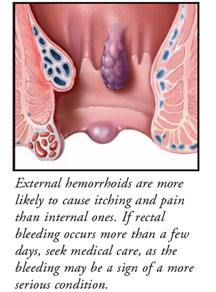 Why Hemorrhoids Form and What Symptoms They Cause
Why Hemorrhoids Form and What Symptoms They Cause
Hemorrhoids are swollen veins around the anus and rectal areas that can cause irritating symptoms such as itching, pain, and bright red blood on the toilet paper or in a bowel movement. These swollen veins can form inside the anus (internal hemorrhoids) or around the anus just under the skin (external hemorrhoids). Hemorrhoids are an annoying problem for about one half of Americans as they age and are a common complaint during pregnancy.
Hemorrhoidal veins become swollen due to age, obesity, prolonged standing, or the pressure of straining during bowel movements with chronic constipation or diarrhea. During pregnancy, hormonal changes and the increased pressure on these veins from an enlarging uterus can cause hemorrhoids to develop.
Self-treatment for hemorrhoids includes anti-inflammatory creams and ointments that help reduce the itching and swelling. Even without treatment, hemorrhoids usually disappear within a few days. If a hemorrhoid does not improve within a few days, or if rectal bleeding is occurring, a doctor should be consulted to rule out a serious condition.
Self-Treatment Often Provides Relief
Swollen hemorrhoidal veins can cause irritating symptoms but are usually not serious. In most cases, symptoms improve with self-care measures. Consult a physician if they do not resolve.
Internal or External
Internal hemorrhoids are those that form inside the anus. These hemorrhoids are most likely to cause bright red blood on the toilet tissue or small amounts of blood in the toilet after a bowel movement. Internal hemorrhoids are not painful, but they can push out through the anus (this is known as a prolapsed hemorrhoid) and cause irritation. External hemorrhoids are those that form below the skin surrounding the anus and are more likely to cause itching and pain. These hemorrhoids can also bleed when irritated and, on occasion, can form a small lump (blood clot) when blood pools in the area of the swollen vein.
When to Consult a Doctor
There are other conditions with symptoms similar to those of hemorrhoids, including serious conditions such as colorectal or anal cancer. As a result, people who experience rectal bleeding, pain, or itching that does not disappear within a few days should consult a doctor. The doctor will examine the anal and rectal areas with a gloved finger and can use a lighted tube to examine the area and confirm the diagnosis of hemorrhoids.
Treatment
Self-care for hemorrhoids includes easing the symptoms of itching and pain with frequent soothing baths, sitting in a tub of warm water for 10 or 15 minutes. A small basin filled with warm water that fits over the toilet, known as a sitz bath, can also be used several times a day. Instead of dry toilet tissue, a towelette moistened with witch hazel can sooth swollen tissues as it cleanses the area after a bowel movement. A nonprescription anti-inflammatory cream, ointment, or suppository can be used to help shrink inflamed tissues and relieve itching. A stool softener or fiber supplement, available without a prescription, may be recommended. Steps to prevent hemorrhoidal flare-ups include eating a high-fiber diet and drinking plenty of water throughout the day to help keep the stool soft and thereby avoid straining. Regular exercise is important to help avoid constipation and lessens sitting or standing for long periods, all of which can increase the pressure on the veins and cause hemorrhoids to flare. It is also important to pass a bowel movement as soon as the urge is felt, so that the stool does not become dry and more difficult to pass.
Persistent hemorrhoids may require outpatient surgery using sclerotherapy (injection of a scar solution), rubber band ligation (tying off the hemorrhoid so it will collapse), or infrared light (cuts off the circulation of small bleeding hemorrhoids). Large hemorrhoids can be surgically removed either in the outpatient setting or in the hospital.
If you have questions about creams, ointments, or suppositories used to treat the pain and itching of hemorrhoids, be sure to ask your pharmacist.











